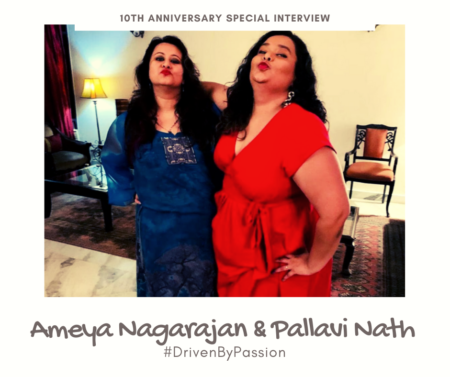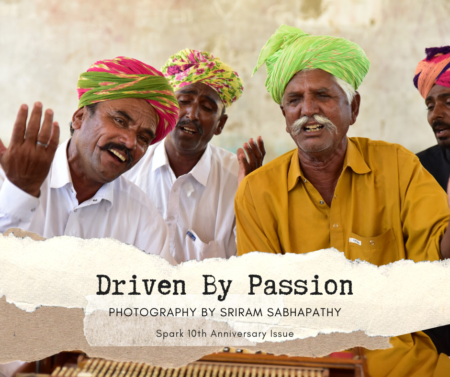An interview with Ameya Nagarajan and Pallavi Nath
Don’t miss this fun and spirited interview with Ameya and Pallavi, creators and hosts of the podcast Fat.So? in which they tell us about all the exciting things they do on body positivity through their podcast.
Ameya Nagarajan is a cook, cat lady, and always reading—this is how all her bios begin. Ameya has four degrees (because she likes to study yaar, and, no, she’s not telling what where when how), but still can’t make her mind about her career. Ameya likes people, food, karaoke and long and rambly conversations about big things and little things. You can find her @ameyann on all social networks, though if you’re going to add her on Facebook please explain why.
Pallavi Nath is fat, female, forty; divorced, non-parent, explorer of the self; business/executive/lifevision coach: these are just some parts of Pallavi’s fierce and fantastic current lived experience. She’s fresh out of a 17-year corporate career in HR in regional, APAC and global leadership roles with both multinational and Indian organisations. Her life is about becoming more authentic, truer to who she is at her core, which led her down this path of fat liberation, among other things! You can find her @pallavi108 (IG), and @pallavinath1979 (Twitter).
What got you started on Fat. So? Why a podcast, and why this topic?
Pallavi: I’ve been on the body positivity journey since 2014 after years of feeling miserable in my body and constantly trying to lose weight. Accepting and then being able to find love for my body changed everything for me and I am therefore very passionate about talking about it. I have also seen that these conversations resonate with men and women whether fat or not, since body shame is something everyone has dealt with at some point in time.
‘Fat. So?’ is a term I’ve been using since my MBA days in conversations as a humorous way of turning around a word that is used as an insult and to bully. When we were thinking of names for what we wanted to do, I suggested this to Ameya and she loved it – we did a quick test with some of our friends and it stuck, much to my delight!
I was interviewed in 2016 by Cat Pause, a fat researcher and activist, for her show “Friends with Marylin”. She is based out of New Zealand but interviews fat women around the world. I loved the experience and it’s been something I wanted to do since then. When I met Ameya and found out her background with podcasts, I had to explore the opportunity! I love the medium of the podcast – for me it’s like having a conversation with a friend about things that truly matter and everyone else being able to hear those points of view and take away what they resonate with.
Ameya: To be honest, the idea was ALL Pallavi! I mean, I’ve made podcasts and when she said she wanted to do this I offered to help her, and then she turned around and said, ‘No, do it with me!’ But when she said it, it made so much sense. A podcast gives you intimacy and privacy at the same time, which is what this kind of a subject, that most people bury deep inside themselves under a ton of shame, really needs. You feel like you’re listening to two friends and you’re in the room with them, just the three of you, but you also don’t have to reveal yourself TO them, and, for us, we don’t have to either.
How has it been talking about your personal experiences on the podcast, especially on topics related to sexuality that are anyway taboo for women and more so for fat women?
Pallavi: I often feel more embarrassed when I hear what I’ve said post recording than when I record J. This is because while we are recording I literally am having a conversation with Ameya and that is a safe space where I can share anything without judgement (errrrr… except when I tell her I identify with the Wiccan traditions ;)).
A lot of what I am saying is emotional stuff that I have processed over time and therefore isn’t triggering or uncomfortable. We have had a few conversations recently, since we record a little in advance, which were cathartic and insightful for me. When it comes to the topic of sexuality I have grown out of my discomfort with talking about that – it possibly comes with age – and it’s fantastic to have found someone like Ameya, who is so open herself. This is again another area that needs a lot more conversation and unpacking!
Ameya: Heh. So, baring my soul to strangers is not something I’m new to at all. I tell new people when I meet them: I have no boundaries, so if you want some you’ll have to set them. I used to write a blog about dating in Delhi, though I didn’t talk about sexual experiences on it, I did post about sex. And I’m pretty open about all this in general, so it’s not really a big jump to making the podcast. I actually wanted to make one on dating (haha) but it wasn’t feeling right, which is CLEARLY because I was waiting for Pallavi to come along.
As a listener, I find that while you take your personal experiences about being fat to make a (subtle) ‘political’ statement, the tone is conversational so we’re allowed to laugh and ponder with you. The conversations aren’t weighed down or ‘activist’y in the sense that we’re not leaving each episode with a ‘message’. Was that a conscious choice? Why?
Pallavi: That’s exactly how it is meant to be, in my opinion. An honest conversation about our lived experience, our thought process and our point of view. We are both very aware of our privilege as educated, exposed-to-the-world, reasonably well-to-do women and we cannot even begin to imagine how things would have been if we did not have this background or the parents we had. We cannot leave a message, because everyone’s experience is different. The message and resonance emerges from the conversation.
Ameya: Yes, it was. Like I said, for me, the greatest power podcasting has is the ability to create a space of intimacy, and to not bore you, because you feel like you’re a part of the conversation. And in conversations with friends you do go from dirty jokes to political issues to vulnerable feelings to teasing one another. The idea is to share the experience, and experiences are usually multifaceted. Think of it like inviting people into my memories and my heart so they can witness firsthand what I felt, which means they see it without any filters. And the value there is that it’s that much easier to empathise and connect with.
What has the response been so far – the good and the not-so-good?
Ameya: It’s been good!!! OMG! SO GOOD! It legit makes me tear up when I think about it – and I’m not a crier, more of a swearer (heh). MANY people reach out to tell us how it has resonated, how it’s made them feel, how they have had similar experiences. It’s that moment of ‘OMG, YES, THAT’S MY LIFE’. We have had – OF COURSE – the OBESITY KILLS/YOU ARE TELLING PEOPLE TO LET THEMSELVES DIE/YOU WILL DIE kinda trolls on social, whom P loves to engage with and then when she’s done I will dismiss them and block them (heh).
What are your plans with Fat. So? for 2020 and beyond?
Pallavi: Season 1 ends in March and we will take a couple of months off :). We want Season 2 to bring in a wider variety of voices and experiences and therefore interviews of women and (some) men across the country are on the cards.
(Interview by Spark Editors)






